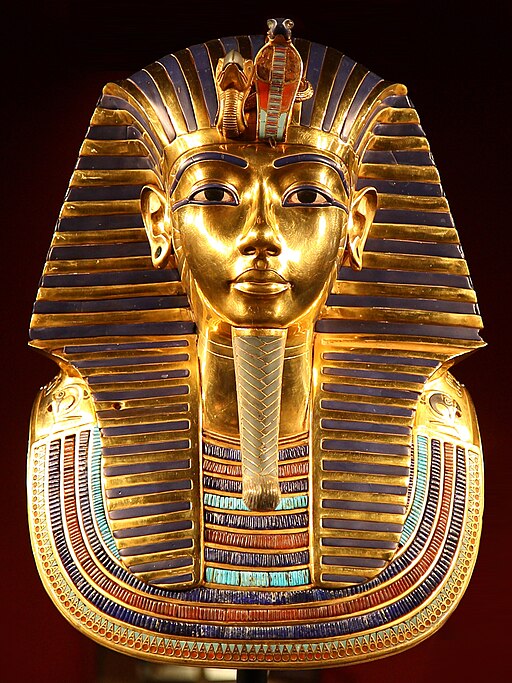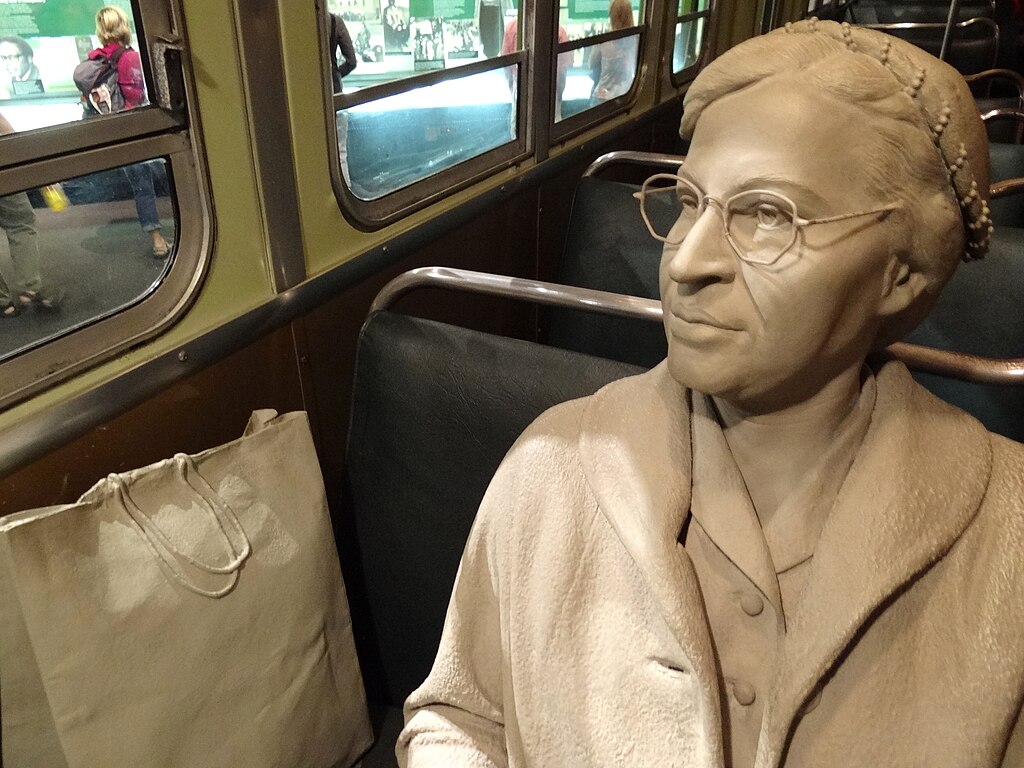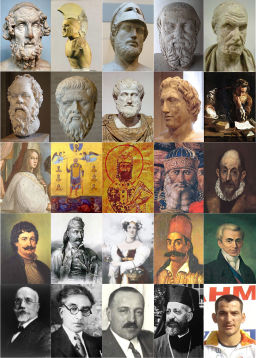
“Lady at the Tea Table” by Mary Cassatt depicts Mary Dickinson Riddle, Cassatt’s mother’s first cousin, seated at a table set with a tea service. The tea set is gilded blue-and-white porcelain from Canton, modern-day Guangzhou, China.
The painting exemplifies Cassatt’s impressionist style. The emphasis is placed on the subject’s contrasting outline, and the subject’s jewelry echoes the gold gilt on the tea service.
Similarly, the faint blue hues used in the background draw the eye to the deeper blues of Riddle’s eyes and the porcelain.
The relative simplicity of the painting’s design is also in contrast to the elaborately detailed art of the porcelain tea set.
The tea set was a gift to Cassatt’s family from Riddle’s daughter, and in turn, this portrait was painted by Cassatt as a gift for the Riddle family.
Unfortunately, Riddle’s daughter disliked the painting because of the way her mother’s nose was portrayed. Thus the painting was donated to the Metropolitan Museum of Art by Cassatt in 1923.
Old China Trade from Canton
The Old China Trade refers to the early commerce between the Qing Empire (which lasted until 1912) and the United States under the Canton System.
The Canton System restricted maritime trade to Canton (modern-day Guangzhou) and represented the beginning of Trade relations between the United States and East Asia, including, eventually, U.S. – China relations.
Chinese export porcelain included a wide range of Chinese porcelain that was made exclusively for export to Europe and later to North America.
The export wares of the 18th century were typically teawares and dinner services, often blue and white decorated with flowers, pine, prunus, bamboo, or with pagoda landscapes, a style that inspired the willow pattern.
Highly decorative Canton porcelain was produced throughout the 19th century, but the quality waned.
By the end of the century, blue and white wares were produced in large quantities, and almost every earlier style and type was copied into the 20th century.
In modern times, historic Chinese export porcelain is popular with the international fine arts market, though recently less so than wares made for the historic domestic Chinese market.
Mary Cassatt
Mary Stevenson Cassatt (1844 – 1926) was an American painter and printmaker. She was born in Pennsylvania but lived much of her adult life in France, where she first befriended Edgar Degas and later exhibited among the Impressionists.
Cassatt often created images of the social and private lives of women, with particular emphasis on the intimate bonds between mothers and children.
Cassatt enjoyed the wave of feminism that occurred in the mid-1800s, allowing relatively more accessible educational opportunities.
She became an outspoken advocate for women’s equality, campaigning with her friends for equal travel scholarships for students in the 1860s, and the right to vote in the 1910s.
As a successful, highly trained woman artist who never married, she portrayed women and mothers with dignity and the suggestion of a more in-depth, meaningful inner life.
Cassatt objected to being stereotyped as a “woman artist” and actively supported women’s suffrage.
Lady at the Tea Table
- Title: Lady at the Tea Table
- Artist: Mary Cassatt
- Year: 1883–85
- Medium: Oil on canvas
- Dimensions: 29 x 24 in. (73.7 x 61 cm)
- Museum: Metropolitan Museum of Art – MET
Mary Cassatt
- Name: Mary Stevenson Cassatt
- Born: 1844 – Allegheny City, Pennsylvania, United States
- Died: 1926 (aged 82) – Château de Beaufresne, near Paris, France
- Nationality: American
- Movement: Impressionism
- Notable Works
- The Child’s Bath
- Mother and Child
- The Boating Party
- Woman with a Pearl Necklace in a Loge
- Offering the Panel to the Bullfighter
- Lady at the Tea Table
Mary Cassatt & Women at the Chicago World’s Fair
Mary Cassatt
A Tour of the Metropolitan Museum of Art
MET European Paintings Collection
- “Pygmalion and Galatea” by Jean-Léon
- “Saint Jerome as Scholar” by El Greco
- “Portrait of Juan de Pareja” by Diego Velázquez
- “Camille Monet on a Garden Bench” by Claude Monet
- “View of Toledo” by El Greco
- “The Musicians” by Caravaggio
- “The Death of Socrates” by Jacques-Louis David
- “The Harvesters” by Pieter Bruegel the Elder
- “Young Woman Drawing” by Marie-Denise Villers
- “The Grand Canal, Venice” by J. M. W. Turner
- “The Houses of Parliament (Effect of Fog)” by Claude Monet
- “Madame Cézanne in a Red Dress” by Paul Cézanne
- “The Fortune Teller” by Georges de La Tour
- “The Allegory of Faith” by Johannes Vermeer
- “Garden at Sainte-Adresse” by Claude Monet
- “Wheat Field with Cypresses” by Vincent van Gogh
- “The Repast of the Lion” by Henri Rousseau
- “The Horse Fair” by Rosa Bonheur
- “Two Men Contemplating the Moon” by Caspar David Friedrich
- “Boy with a Greyhound” by Paolo Veronese
- “A Windy Day on the Pont des Arts” by Jean Béraud
- “Sunday at the Church of Saint-Philippe-du-Roule, Paris” by Jean Béraud
- “The Boulevard Montmartre on a Winter Morning” by Camille Pissarro
- “The Sorrow of Telemachus” by Angelica Kauffman
- Lukas Spielhausen by Lucas Cranach the Elder
MET Modern and Contemporary Art Collection
- “Reclining Nude” by Amedeo Modigliani
- “Improvisation 27 (Garden of Love II)” by Wassily Kandinsky
- “Jeanne Hébuterne” by Amedeo Modigliani
- “The Card Players” by Paul Cézanne
- “Bathers” by Paul Cézanne
MET American Wing Collection
- “Washington Crossing the Delaware” by Emanuel Leutze
- “Portrait of Madame X” by John Singer Sargent
- “Mother and Child” by Mary Cassatt
- “Fur Traders Descending the Missouri” by George Caleb Bingham
- “The Gulf Stream” by Winslow Homer
- “The Parthenon” by Frederic Edwin Church
- “The Aegean Sea” by Frederic Edwin Church
- “Alexander Hamilton” by John Trumbull
- “Lady at the Tea Table” by Mary Cassatt
Mary Cassatt
MARY CASSATT
~~~
“It is as well not to have too great an admiration for your master’s work. You will be in less danger of imitating him.”
– Mary Cassatt
~~~
Photo Credit: Mary Cassatt [Public domain]
Popular this Week








 Sponsor your Favorite Page
Sponsor your Favorite Page SEARCH Search for: Search Follow UsJoin – The JOM Membership Program
Sponsor a Masterpiece with YOUR NAME CHOICE for $5
Share this:
- Tweet
